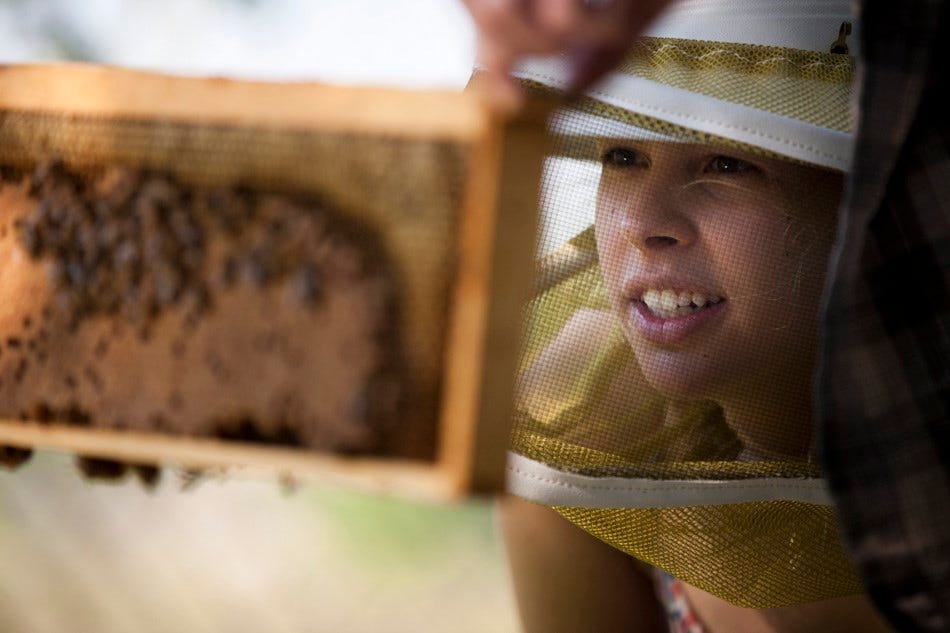Bloomington Startup Swarms Beekeeping Industry
 The Bee Corp. Chief Executive Officer Ellie Symes observes bees. The company's technology monitors hives' internal temperature.
The Bee Corp. Chief Executive Officer Ellie Symes observes bees. The company's technology monitors hives' internal temperature.
Subscriber Benefit
As a subscriber you can listen to articles at work, in the car, or while you work out. Subscribe NowHoney bees are somewhat mysterious creatures with profound capabilities that scientists can’t fully decode. However, Bloomington-based startup The Bee Corp—led by a group of recent Indiana University graduates—believes it can remove some of the mystery surrounding bees and help beekeepers have more productive hives. After years of development, the team is launching its technology this spring with beekeepers throughout Indiana to take the sting out of hive loss.
The Bee Corp’s hive-monitoring technology helps beekeepers battle colony collapse disorder (CCD), which the U.S. Environmental Protection Agency describes as the phenomenon that occurs when the majority of worker bees in a colony disappear, resulting in a hive that doesn’t survive the winter months. The agency says CCD causes the loss of up to about 30 percent of hives.
The queen is the key to a hive’s health and productivity; she’s solely responsible for laying all of the eggs inside a hive, some 2,000 every day.
“Even if you have just one day that [the queen] is under-producing, you lose 2,000 of your eggs,” says The Bee Corp Chief Marketing Officer Wyatt Wells. “The average lifespan of a worker bee is two to three weeks, so even with just one day of losing 2,000 eggs, the impact compounds very quickly.”
It’s well known in the beekeeping world that the internal temperature of the hive is also critical. Through its research and development, The Bee Corp found “a clear temperature range” in which the queen is capable of laying productively. Therefore, its first technology, called Queen’s Guard, monitors the temperature inside a hive.
Queen’s Guard relies on a tiny sensor inside the hive that collects real-time temperature data. While the sensors are readily available on the market, The Bee Corp sends the data through an algorithm.
“The sensors simply churn out the data, they don’t give any interpretation. The value we create is running the data analysis, so we can provide actionable results for the beekeeper,” says Wells. “Our algorithm interprets the data, then the software instantly alerts the beekeeper of imminent threats to the hive.”
The beekeeper can take immediate action, such as re-queening the hive, which involves replacing a non-laying queen with a productive one. The Bee Corp has sold its product to several beekeepers in the state and will be installing Queen’s Guard in the coming days. Jeff Singletary is one of The Bee Corp’s clients; he’s the co-owner and “J” in RJ Honey, a honey sales company in Lebanon that serves hobbyist beekeepers and “local honey lovers.”
“This is a side business for us, so we can’t get around to visit our hives as often as we’d like,” says Singletary. “This remote monitoring could be something that is very, very helpful to us.”
Singletary says losing a hive is “a huge economic loss.” RJ Honey operates about 80 hives and says typical winter loss is around 20 percent, but one season climbed as high as 50 percent. The Bee Corp is installing Queen’s Guard on 20 of RJ Honey’s hives this spring.
“We’re hoping to see some patterns, then make some sense of those patterns,” says Singletary. “If we can be proactive and see that a hive just isn’t thriving, we can go do some hive management to help it get righted again before it dies or something else happens to it.”
In the coming months, The Bee Corp aims to collect feedback from beekeepers using the technology to see if there are ways to improve the product. Meanwhile, the startup will be experimenting with its own hives to identify any other data points that “might prove to create more valuable insights.”
“Beekeepers are very traditional in their ways; almost every beekeeper has their own way of managing things and addressing threats,” says Wells. “We don’t want to step in and tell them what to do; we just want to be as undisruptive as possible while giving them the most up-to-date information to make those decisions on their own.”
The Bee Corp is hopeful such decision-making will save hives and fulfill the company’s mission to protect the mysterious art of beekeeping for generations to come.
Wells says the company’s mission goes beyond simply collecting data.
Singletary served on the Indiana Beekeepers’ Association board for eight years; he’s hopeful the technology can help the hobby “stick” like honey.
